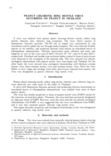PEANUT CHLOROTIC RING MOTTLE VIRUS OCCURRING ON PEANUT IN THAILAND
Country
Thailand
Technical bulletin of the Tropical Agriculture Research Center
| ISSN | 03889394 |
|---|---|
| NII recode ID (NCID) | AA00857848 |

Full text
techtarc21-_150-157.pdf1.32 MB
A virus was isolated from peanut plants showing distinct mottle, yellow ring mottle, chlorotic spot, chlorotic ring symptoms. The virus which consists of filamentous flexuous particles 730-750 nm in length was transmitted by sap inoculation and by aphid, but not through seeds of peanut. The virus infected 16 plant species in six families, and produced chlorotic local lesions on inoculated leaves of Chenopodium amaranticolor. Thermal inactivation point, dilution end point and longevity in vitro of the virus were 55-60°C (10 min), 10-4-10-5, and 14-21 days (20°C), respectively. Pinwheel and bundle type inclusion bodies typical of those of potyviruses were observed in the cytoplasm of the infected cells. The virus showed very distant serological relationships with peanut mottle virus from Japan and Thailand. On the other hand, the virus showed close serological relationships with blackeye cowpea mosaic virus, bean common mosaic virus and soybean mosaic virus. Since the virus differs in host range and serology from other potyviruses reported from peanut, the virus was designated as peanut chlorotic ring mottle virus.
| Date of issued | |
|---|---|
| Creator | Fumiyoshi FUKUMOTO Pornpod THONGMEEARKOM Mitsuro IWAKI Duangchi CHOOPANYA Nonglak SARINDU Nualchan DEEMA Tsuneo TSUCHIZAKI |
| Publisher | Tropical Agriculture Research Center |
| Volume | 21 |
| spage | 150 |
| epage | 157 |
| Language | eng |
